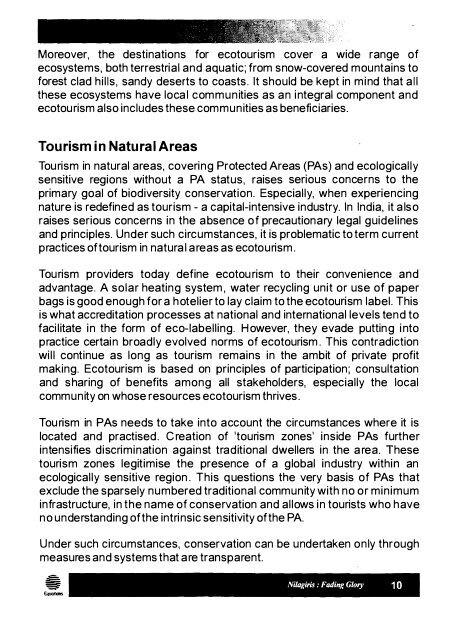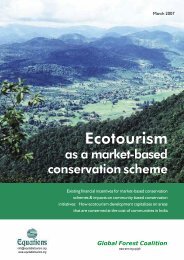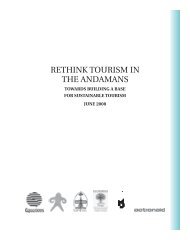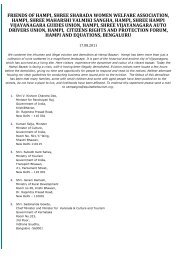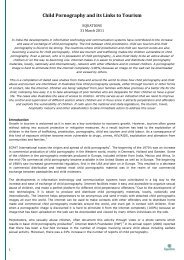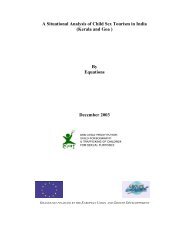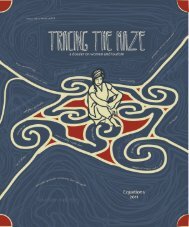Nilgiris Biosphere Reserve - Equitable Tourism Options
Nilgiris Biosphere Reserve - Equitable Tourism Options
Nilgiris Biosphere Reserve - Equitable Tourism Options
Create successful ePaper yourself
Turn your PDF publications into a flip-book with our unique Google optimized e-Paper software.
Moreover, the destinations for ecotourism cover a wide range of<br />
ecosystems, both terrestrial and aquatic; from snow-covered mountains to<br />
forest clad hills, sandy deserts to coasts. It should be kept in mind that all<br />
these ecosystems have local communities as an integral component and<br />
ecotourism also includes these communities as beneficiaries.<br />
<strong>Tourism</strong> in Natural Areas<br />
<strong>Tourism</strong> in natural areas, covering Protected Areas (PAs) and ecologically<br />
sensitive regions without a PA status, raises serious concerns to the<br />
primary goal of biodiversity conservation. Especially, when experiencing<br />
nature is redefined as tourism - a capital-intensive industry. In India, it also<br />
raises serious concerns in the absence of precautionary legal guidelines<br />
and principles. Under such circumstances, it is problematic to term current<br />
practices oftourism in natural areas as ecotourism.<br />
<strong>Tourism</strong> providers today define ecotourism to their convenience and<br />
advantage. A solar heating system, water recycling unit or use of paper<br />
bags is good enough for a hotelier to lay claim to the ecotourism label. This<br />
is what accreditation processes at national and international levels tend to<br />
facilitate in the form of eco-Iabelling. However, they evade putting into<br />
practice certain broadly evolved norms of ecotourism. This contradiction<br />
will continue as long as tourism remains in the ambit of private profit<br />
making. Ecotourism is based on principles of participation; consultation<br />
and sharing of benefits among all stakeholders, especially the local<br />
community on whose resources ecotourism thrives.<br />
<strong>Tourism</strong> in PAs needs to take into account the circumstances where it is<br />
located and practised. Creation of 'tourism zones' inside PAs further<br />
intensifies discrimination against traditional dwellers in the area. These<br />
tourism zones legitimise the presence of a global industry within an<br />
ecologically sensitive region. This questions the very basis of PAs that<br />
exclude the sparsely numbered traditional community with no or minimum<br />
infrastructure, in the name of conservation and allows in tourists who have<br />
no understanding of the intrinsic sensitivity ofthe PA.<br />
Under such circumstances, conservation can be undertaken only through<br />
measures and systems that are transparent.<br />
<br />
Eittmt'ats<br />
NilDgiris : Fading Glory 10


